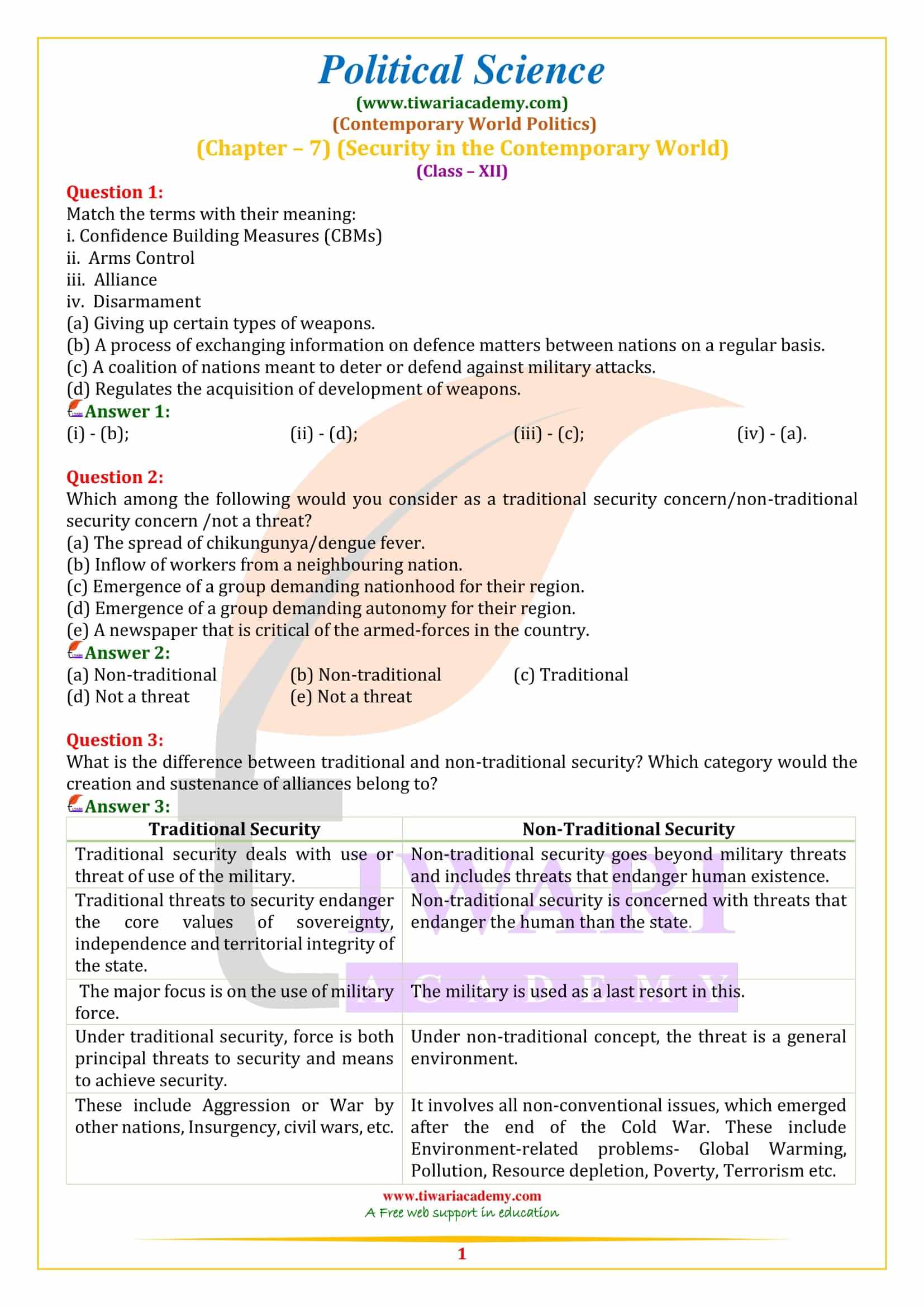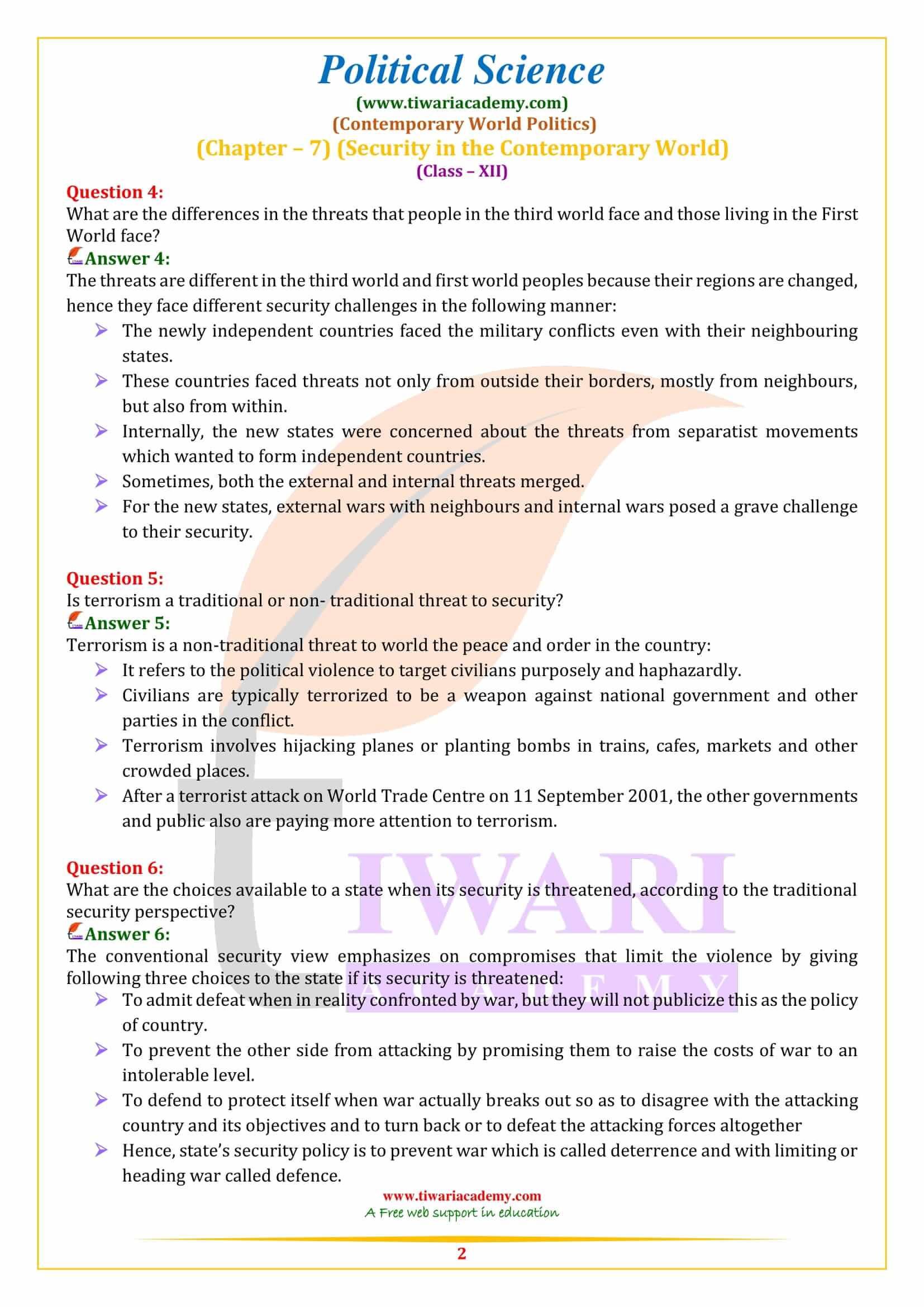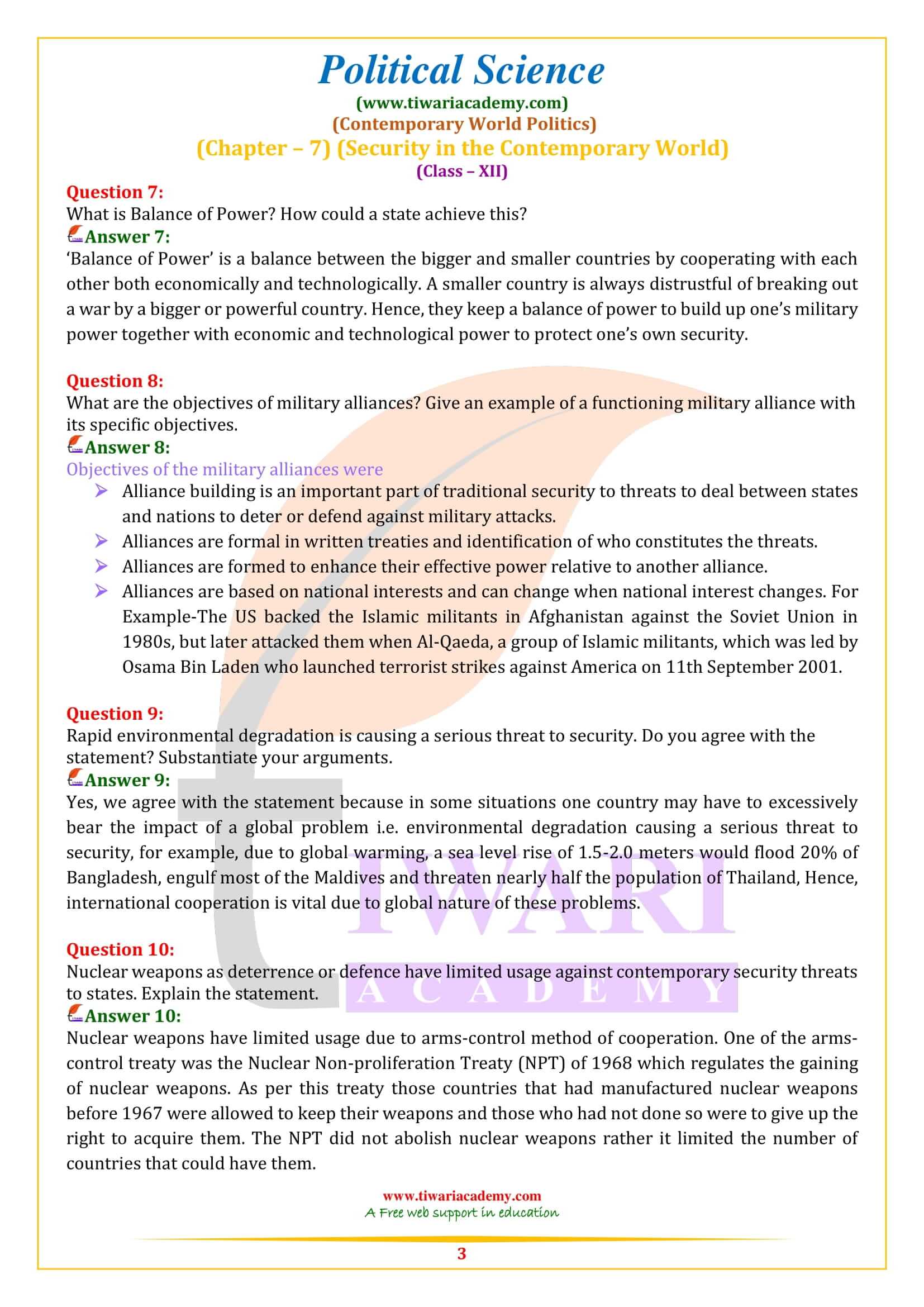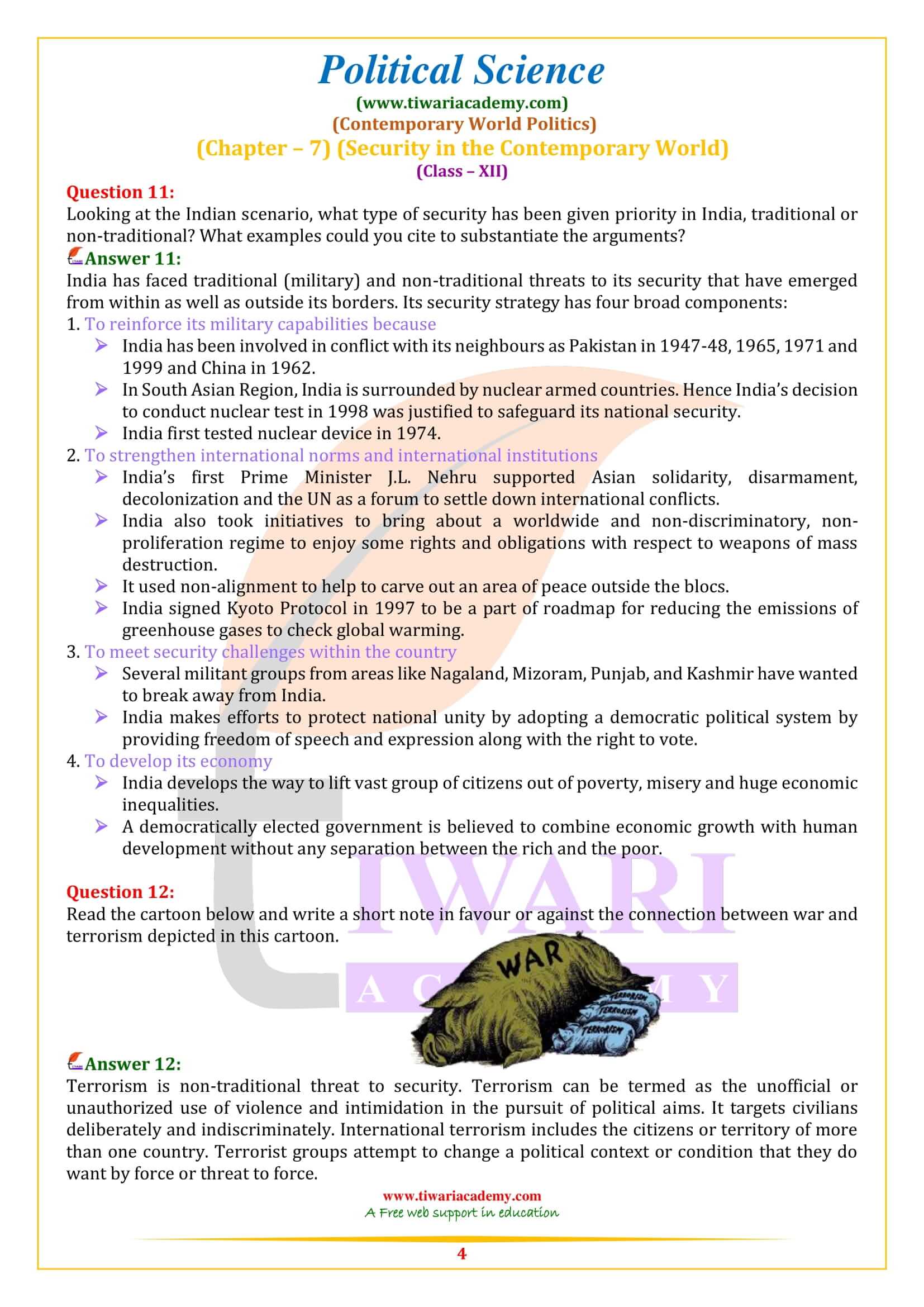NCERT Solutions for Class 12 Political Science Chapter 7 Security in the Contemporary World in Hindi and English Medium for new academic session 2025-26. These solutions of Class 12 Political Science Part 1 Contemporary World Politics chapter 7 are useful for CBSE as well as State board students. Get the extra questions based on chapter 7 of 12th Political Science.
NCERT Solutions for Class 12 Political Science Chapter 7
Class 12 Political Science Chapter 7 Security in the Contemporary World
Class 12 Political Science Chapter 7 Question Answers
What are the differences in the threats that people in the third world face and those living in the First World face?
The threats are different in the third world and first world peoples because their regions are changed, hence they face different security challenges in the following manner:
- The newly independent countries faced the military conflicts even with their neighbouring states.
- These countries faced threats not only from outside their borders, mostly from neighbours, but also from within.
- Internally, the new states were concerned about the threats from separatist movements which wanted to form independent countries.
- Sometimes, both the external and internal threats merged.
- For the new states, external wars with neighbours and internal wars posed a grave challenge to their security.
Is terrorism a traditional or non- traditional threat to security?
Terrorism is a non-traditional threat to world the peace and order in the country:
- It refers to the political violence to target civilians purposely and haphazardly.
- Civilians are typically terrorized to be a weapon against national government and other parties in the conflict.
- Terrorism involves hijacking planes or planting bombs in trains, cafes, markets and other crowded places.
- After a terrorist attack on World Trade Centre on 11 September 2001, the other governments and public also are paying more attention to terrorism.
What are the choices available to a state when its security is threatened, according to the traditional security perspective?
The conventional security view emphasizes on compromises that limit the violence by giving following three choices to the state if its security is threatened:
- To admit defeat when in reality confronted by war, but they will not publicize this as the policy of country.
- To prevent the other side from attacking by promising them to raise the costs of war to an intolerable level.
- To defend to protect itself when war actually breaks out so as to disagree with the attacking country and its objectives and to turn back or to defeat the attacking forces altogether
- Hence, state’s security policy is to prevent war which is called deterrence and with limiting or heading war called defence.
What is Balance of Power? How could a state achieve this?
Balance of Power is a balance between the bigger and smaller countries by cooperating with each other both economically and technologically. A smaller country is always distrustful of breaking out a war by a bigger or powerful country. Hence, they keep a balance of power to build up one’s military power together with economic and technological power to protect one’s own security.
What are the objectives of military alliances? Give an example of a functioning military alliance with its specific objectives.
Objectives of the military alliances were
- Alliance building is an important part of traditional security to threats to deal between states and nations to deter or defend against military attacks.
- Alliances are formal in written treaties and identification of who constitutes the threats.
- Alliances are formed to enhance their effective power relative to another alliance.
- Alliances are based on national interests and can change when national interest changes. For Example-The US backed the Islamic militants in Afghanistan against the Soviet Union in 1980s, but later attacked them when Al-Qaeda, a group of Islamic militants, which was led by Osama Bin Laden who launched terrorist strikes against America on 11th September 2001.
Rapid environmental degradation is causing a serious threat to security. Do you agree with the statement? Substantiate your arguments.
Yes, we agree with the statement because in some situations one country may have to excessively bear the impact of a global problem i.e. environmental degradation causing a serious threat to security, for example, due to global warming, a sea level rise of 1.5-2.0 meters would flood 20% of Bangladesh, engulf most of the Maldives and threaten nearly half the population of Thailand, Hence, international cooperation is vital due to global nature of these problems.
Nuclear weapons as deterrence or defence have limited usage against contemporary security threats to states. Explain the statement.
Nuclear weapons have limited usage due to arms-control method of cooperation. One of the arms-control treaty was the Nuclear Non-proliferation Treaty (NPT) of 1968 which regulates the gaining of nuclear weapons. As per this treaty those countries that had manufactured nuclear weapons before 1967 were allowed to keep their weapons and those who had not done so were to give up the right to acquire them. The NPT did not abolish nuclear weapons rather it limited the number of countries that could have them.
Looking at the Indian scenario, what type of security has been given priority in India, traditional or non-traditional? What examples could you cite to substantiate the arguments?
India has faced traditional (military) and non-traditional threats to its security that have emerged from within as well as outside its borders. Its security strategy has four broad components:
1. To reinforce its military capabilities because
- India has been involved in conflict with its neighbours as Pakistan in 1947-48, 1965, 1971 and 1999 and China in 1962.
- In South Asian Region, India is surrounded by nuclear armed countries. Hence India’s decision to conduct nuclear test in 1998 was justified to safeguard its national security.
- India first tested nuclear device in 1974.
2. To strengthen international norms and international institutions
- India’s first Prime Minister J.L. Nehru supported Asian solidarity, disarmament, decolonization and the UN as a forum to settle down international conflicts.
- India also took initiatives to bring about a worldwide and non-discriminatory, non-proliferation regime to enjoy some rights and obligations with respect to weapons of mass destruction.
- It used non-alignment to help to carve out an area of peace outside the blocs.
- India signed Kyoto Protocol in 1997 to be a part of roadmap for reducing the emissions of greenhouse gases to check global warming.
3. To meet security challenges within the country
- Several militant groups from areas like Nagaland, Mizoram, Punjab, and Kashmir have wanted to break away from India.
- India makes efforts to protect national unity by adopting a democratic political system by providing freedom of speech and expression along with the right to vote.
4. To develop its economy
- India develops the way to lift vast group of citizens out of poverty, misery and huge economic inequalities.
- A democratically elected government is believed to combine economic growth with human development without any separation between the rich and the poor.





